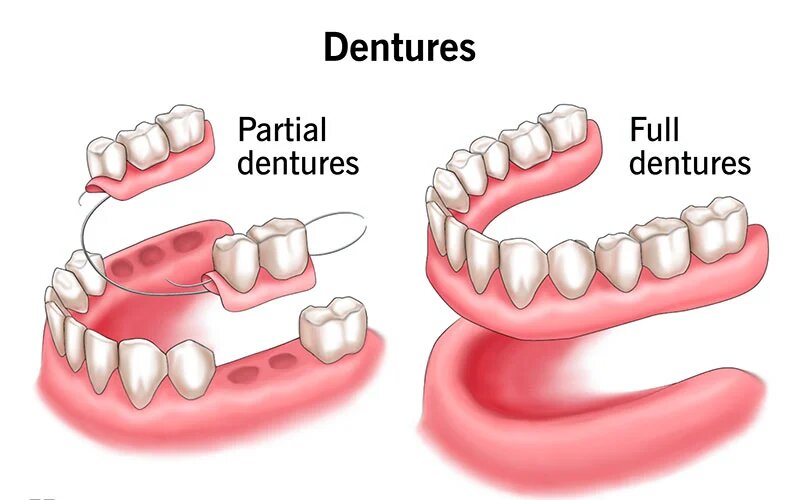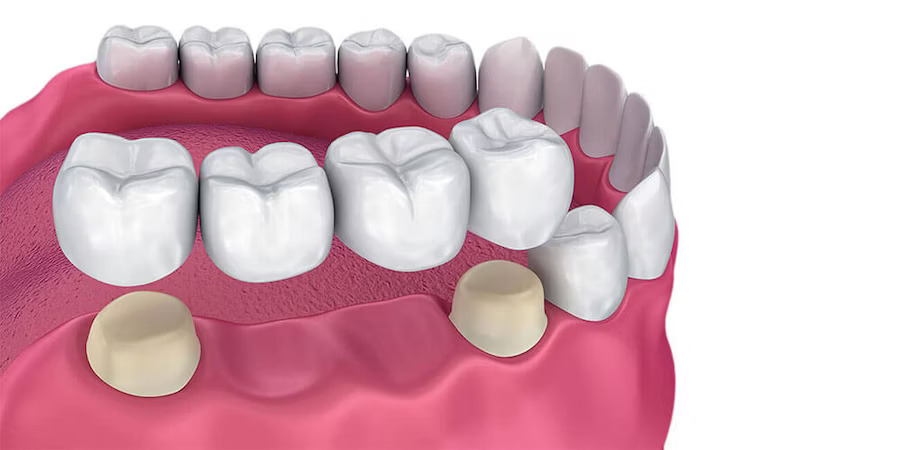The Need For Dental Restoration Options
Tooth loss is a common problem among older adults; according to the CDC, over a quarter of those aged 65 and older have lost some (or all) of their teeth. Fortunately, modern dentistry offers several solutions for replacing missing teeth, such as dental implants, dentures, and bridges. Each dental restoration has unique advantages and limitations, however, so it’s imperative to understand your treatment options before deciding on a treatment.
To help you prepare for your dental consultation, we’ve compiled a simple guide outlining the differences between dental implants, dentures, and bridges. In this article, we’ll explain the pros and cons of each dental restoration option, including their affordability, longevity, and impact on oral health and overall quality of life. We’ll also discuss who makes a good candidate for each type of procedure.
Dental Implants
Dental implants are a popular option because they are a permanent solution that emulates the look and feel of natural teeth. Implants (titanium posts) are surgically placed into the jaw bone and are designed to fuse with the bone over time (a process known as osseointegration). Once the implant is secure, a crown is placed on top, making the implant indistinguishable from the patient’s other teeth. Implants can replace one missing tooth or multiple teeth and provide excellent stability during chewing, allowing patients to enjoy an unrestricted diet. Unlike dentures, they stimulate the jawbone during chewing, which prevents bone loss and preserves the patient’s facial structure.

Advantages of Dental Implants
Improved Longevity andStability. Dental implants can last 15-20 years or longer and will not shift during chewing or speaking. As such, implants are considered the most permanent, functional, and comfortable replacement for missing teeth.
Significant Oral Health Benefits. Dental implants are the only treatment for missing teeth that completely prevents loss of jawbone density. By supporting the surrounding teeth and jaw, dental implants help patients avoid further tooth loss that might otherwise result from bite misalignment and uneven wear.
Ease of maintenance. Dental implant care is similar to natural teeth, consisting of regular brushing, flossing, and dental exams. Unlike dentures, implants don’t require the use of adhesives or special cleansers.
Aesthetic advantages. In addition to keeping the patient’s smile properly aligned, dental implants preserve the shape and projection of the jaw. In doing so, they prevent the development of loose skin and a prematurely aged appearance. Dental implants also provide the most natural appearance of any restoration for missing teeth, closely mimicking the look and feel of real teeth.
Minimally invasive procedure. Unlike dental bridges, dental implants don’t require the modification of the surrounding teeth.
Disadvantages of Dental Implants
Cost. Dental implants are more expensive upfront than dentures or bridges (but require less frequent adjustment and repair, which reduces their lifetime cost). Not all dental insurance plans cover the cost of implants, so patients may need to seek alternative financing options.
Extended treatment time. Depending on which dental implant is used, dental implant surgery may take three to six months from start to finish. While patients typically heal from implant surgery within a week, osseointegration occurs over several months, delaying crown placement.
Surgical considerations. Patients must meet specific criteria to be eligible for dental implant surgery. Dental implants are most suitable for healthy nonsmokers with good jawbone density. Patients with significant jawbone deterioration or increased susceptibility to infection (due to smoking or the presence of certain health conditions) may not be good candidates for this procedure.
Dentures
Dentures are removable appliances that are designed to replace multiple missing teeth. They come in two types: full dentures and partial dentures. Full dentures are used when all of the teeth are missing, while partial dentures are used when some natural teeth remain. Dentures can be a good option for those who are not suitable candidates for dental implants due to a loss of jawbone density or other factors. While dentures require a period of adjustment for most patients, they can improve speech, eating, and appearance.

Advantages of Dentures
Versatility. Dentures are suitable for a wide range of patients, including those with advanced jawbone deterioration, edentulism, and health or lifestyle concerns that may interfere with healing.
Affordability. Dentures are the most affordable replacement for multiple missing teeth. Not only is their upfront cost lower than that of implants or bridges, but they’re also more likely to be covered by dental insurance or government-funded dental programs.
Convenience. Dentures are completely non-invasive; they don’t require surgery or the modification of remaining teeth, and they’re easy to remove and replace.
Disadvantages of Dentures
Discomfort. Dentures are less stable than bridges and implants. They rely on suction and adhesives to stay in place and can become loose during normal activities, such as speaking and chewing. As a result, patients may feel self-conscious and avoid eating certain foods. Dentures may also cause gum irritation and interfere with speaking, making them cumbersome and uncomfortable for many patients.
Aesthetic concerns. While dentures can look natural when well-crafted and properly fitted, they are visibly different from natural teeth, especially along the gum line. Traditional dentures also allow the jawbone to deteriorate (because they do not provide adequate stimulation during chewing), which can cause unwanted changes in facial appearance.
Lack of oral health benefits. Unlike dental implants and bridges, dentures provide limited support for remaining teeth. The movement of partial dentures can also damage abutment teeth, making further tooth loss more likely.
Higher maintenance requirements. Though dentures can last ten years or longer, they are harder to care for than dental implants. As the jawbone deteriorates, dentures frequently need to be adjusted and refitted, creating additional costs for the patient. Dentures also require daily removal, cleaning, and overnight immersion in a cleaning solution to prevent bad breath, staining, and gum irritation.
Dental Bridges
Bridges are another option for replacing missing teeth. They involve attaching an artificial tooth or teeth to the adjacent natural teeth using dental crowns. To place a bridge, the dentist must first shave down the supporting healthy teeth, to fit the dental crowns. Bridges are also more difficult to clean than dental implants or natural teeth and the supporting teeth can be prone to decay. However, for those with healthy remaining teeth, they provide a convenient option for restoring an even bite.

Advantages of Bridges
Reduced treatment time. As compared to dental implants, dental bridges have a relatively short procedure timeline of two to three weeks and don’t require invasive surgery.
Moderate cost. While dental bridges cost more than dentures, they cost less than dental implants. Bridges also have broader insurance coverage than dental implants because they have a longer history of use.
Natural appearance. Dental bridges are designed to perfectly match the shape, size, and colour of surrounding teeth.
Enhanced comfort and stability. Once a dental bridge is placed, it will look, feel, and function like the patient’s natural teeth. Dental bridges deliver an even, stable bite force and will not shift during normal use.
Disadvantages of Bridges
Oral health concerns. Special care must be taken when cleaning around and below dental bridges to prevent plaque accumulation. Because cleaning dental bridges can be challenging, these restorations are prone to decay.
Reduced durability. Though dental bridges can last 10-15 years with proper care, their success depends heavily on the health of adjacent teeth and their location in the mouth. Dental bridges inserted between molar teeth are susceptible to damage during chewing, which may limit the ability to eat hard or chewy foods.
Tooth decay and gum disease can also cause these restorations to fail prematurely. Maintaining a dental bridge requires thorough home care, frequent dental exams, and professional cleanings.
Unsuitable for some patients. While bridges can replace several missing teeth, they are unsuitable for patients with few remaining natural teeth. They also cannot be used if the adjacent teeth are in poor health.
Conclusion
Ultimately, the best option for replacing missing teeth will depend on individual circumstances, such as the number of missing teeth, the health of the remaining teeth, and personal preferences. Patients with excellent oral health and just one or two missing teeth may benefit from a dental bridge, especially if the missing teeth are at the front of the mouth. Patients with multiple missing teeth (or missing molars) should consider dental implants, as they offer enhanced durability, stability, and preservation of jawbone integrity. Dentures, on the other hand, provide an appropriate option for those who can’t have dental implant surgery.
To ensure you make the right choice when selecting a replacement for missing teeth, it’s crucial to discuss your options with an experienced dentist. As one of Mississauga’s leading dental implant surgeons, Dr. Oscar Dalmao can help you find a restoration that fits your lifestyle, needs, and budget. Contact us today to learn how we can help you rebuild your smile.


